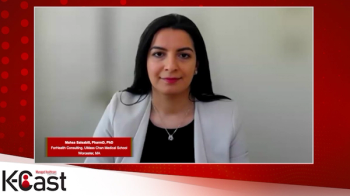
Psychological Phenotypes Correlate with Response to Digital Therapy for Anxiety
By clustering patients based on self-reported data, investigators said they may be able to predict which patients are most likely to respond to a digital therapy.
A patient’s psychological phenotype could be an indication of whether the patient will respond to a digital therapy for anxiety, according to a new report.
The study offers insights that could help clinicians offer personalized care to patients with psychological conditions, but it also could explain why some patients respond more strongly than others to the types of therapy often leveraged by prescription digital therapeutics. The findings were
Corresponding author
“Ideal personalized medicine approaches would be low cost, easily implemented and scalable at a population level,” said Taylor and her colleagues.
In the case of anxiety disorders specifically, the investigators said there is currently no systematic, evidence-based process by which to select treatments for individual patients, despite significant data showing responses to particular therapies are highly variable between patients.
“In clinical practice, treatment selection is guided by factors such as cost/benefit evaluation of clinical vs. side effects, or personal experience of the healthcare practitioner,” they wrote.
An alternative approach, the investigators posit, is “psychological phenotyping,” or clustering patients based on salient self-reported characteristics.
In the new report, Taylor and colleagues set out to identify psychological phenotypes of patients with anxiety disorders. They conducted two studies designed to elucidate phenotypes and then to see how patients of different phenotypes responded to a digital therapeutic that uses mindfulness training to relieve symptoms of anxiety.
In the first study, 63 patients were randomly assigned to either use the mindfulness app for two months or to continue with therapy as usual. Changes in the patients’ anxiety levels and symptoms were assessed at one and two months. The second study was much larger, with 14,010 patients who responded to an email recruitment invitation from Sharecare Inc., the mindfulness app’s developer.
Based on those two studies, the investigators developed three phenotypes of patients. Cluster 1 was patients who were “severely anxious with body/emotional awareness.” Cluster 2 was patients who were “body/emotionally unaware,” because they scored the lowest on the app’s awareness-related intervention features. Finally, Cluster 3 was made up of patients deemed “nonreactive and aware.”
The first study found patients in clusters 1 and 3 had a significant response to the digital therapy relative to controls, but the same was not true for patients in Cluster 2. Taylor and colleagues said the findings are notable because the phenotypes are based on patient reports. Thus, they said, this type of phenotyping amounts to a low-cost method of matching patients with the optimal treatment.
“In essence, clinicians could benefit from this information by recommending this type of mindfulness-based intervention as higher-line treatment options to anxious patients with interoceptive awareness (Cluster 1) or lower anxiety/worry with high awareness (Cluster 3) as they showed large effect sizes of symptom improvement but opt for a different treatment selection for participants with some anxiety/lower interoceptive awareness (Cluster 2),” they wrote.
The findings could provide important insights for the developers of prescription digital therapeutics, many of which rely on strategies such as mindfulness training and cognitive behavioral therapy. As digital therapeutics developers seek to encourage more clinicians to prescribe their products, studies like these might make it easier for prescribers to understand whether or not a particular patient is likely to benefit from the therapy.
Taylor and colleagues said future research could look at the neurobiological underpinnings of these phenotypes in order to better understand not just which patients might respond to a particular therapy, but why.
Newsletter
Get the latest industry news, event updates, and more from Managed healthcare Executive.




















